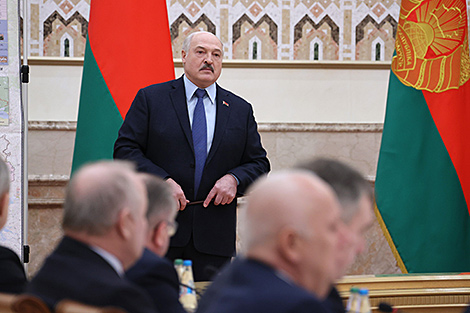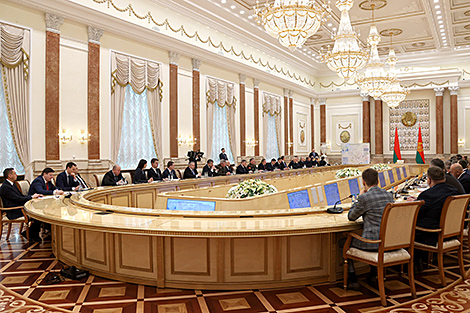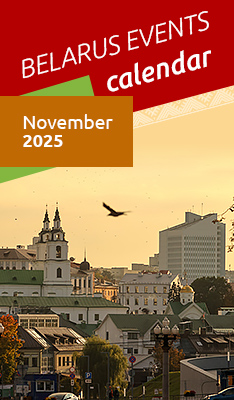Opinions & Interviews
Lukashenko explains when Russia was supposed to withdraw troops from Belarus’ south

MINSK, 1 March (BelTA) – At a conference, which was held on 1 March and gathered members of the Security Council and top officials of the Council of Ministers, Belarus President Aleksandr Lukashenko explained why he had asked Russia to leave some of the troops in Belarus’ south in the current situation and when the troops were supposed to be withdrawn, BelTA has learned.
Aleksandr Lukashenko said: “In the current situation I asked the president of Russia to leave only part of the troops in order to cover only the Gomel direction. Because the middle of our border with Ukraine is impassable forests and swamps, rivers. We have something to cover the Brest direction with. A good brigade is deployed over there and more than that. But since we’ve never intended to fight against Ukraine and never thought that we will face a threat from Ukraine, we’ve never deployed armed forces in the direction of Gomel and other areas.”
The president also said when the remaining Russian troops were supposed to be withdrawn. “I promised the president of Russia: you will take back these troops when according to our plan we… Several months before Russia’s conflict with Ukraine we set out to create the southern operational direction. We arranged a public conference under my leadership and determined what armed forces, troops, and hardware should be located there. It was planned in advance. We didn’t manage to do it in time. And after all we intended to accomplish it over the course of two years because we understood that we have nothing to fight over with Ukraine. But regretfully one has to defend if politics is like that,” he said.
Aleksandr Lukashenko added: “We reinforced border service units, created maneuvering forces over there and General [Chairman of the State Border Committee of Belarus Anatoly] Lappo was instructed to cover the state border with Ukraine as much as possible. I should say he managed to do it successfully. But the situation required reinforcing the southern direction with army units. I emphasize once again: this is why I asked Putin to leave some units behind particularly in the direction of Mozyr and Gomel.”
Aleksandr Lukashenko said: “I say with absolute honesty and sincerity that we left several attack aircraft in Luninets, we left several helicopters, a couple of aircraft in Gomel and several aircraft in Baranovichi. Units of the Russian Armed Forces, which were located in, so to say, the Chernobyl direction back then, in late February also remained. The Mozyr-Gomel direction with access to Chernobyl. Those were the [Russian] armed forces left in our territory. Only about 10,000.”

The president also pointed out that Ukraine had deployed twice as many troops at the Belarusian border by then. “And more than that. Heavy weapons, missile systems, including Tochka-U, were moved towards our border, which had never been characteristic of Ukraine,” he said.
Aleksandr Lukashenko said that when he asked Vladimir Putin to leave some units of the Russian army behind after the joint exercise in Belarus’ south, the Russian president initially remarked that plans to withdraw the troops right away had been stated before. “I said we could state anything we want but intelligence data indicates a concentration of forces in the south. Double check it,” the Belarusian leader revealed details.
After the data was double checked, Vladimir Putin said: “Yes, you are right, we should leave part of Russia’s Armed Forces behind so that they could interact with yours over there.” Vladimir Putin added it would send an additional signal to Ukrainian authorities that “we don’t intend to fool around, they may come to their senses”. “They didn’t,” Aleksandr Lukashenko said.







 print version
print version make home page
make home page add to bookmarks
add to bookmarks

